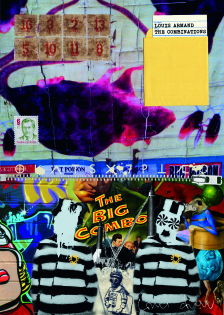THE COMBINATIONS
a novel, by Louis Armand
ISBN 978-0-9571213-6-2Paperback, 888pp
Publication date: May 2016
Equus Press: London
Price: € 22.00 (not including postage)

The "European anti-novel" in all its unrepentant glory is here in The Combinations, following in the tradition of Sterne, Rabelais, Cervantes, Joyce, Perec.
In 8 octaves, 64 chapters and on 888 pages, Louis Armand's The Combinations is a "work of attempted fiction" that combines the beauty & intellectual exertion that is chess with the panorama of futility & chaos that is Prague (a.k.a. "Golem City"), across the 20th-century and before/after. Golem City, the ship of fools boarded by the famed D's (e.g. John) and K's (e.g. Edward) of the 16th/17th centuries (who attempted and failed to turn lead into gold), and the infamous H's (e.g. Adolf, e.g. Reinhard) of the 20th (who attempted and succeeded in turning flesh into soap). Armand's prose weaves together the City's thousand-and-one fascinating tales with a deeply personal account of one lost soul set adrift amid the early-90s' awakening from the nightmare that was the previous half-century of communist Mitteleuropa. The Combinations is a text whose 1) erudition dazzles, 2) structure humbles, 3) monotony never bores, 4) humour disarms, 5) relentlessness overwhelms, 6) storytelling captivates, 7) poignancy remains poignant, and 8) style simply never exhausts itself. Your move, Reader.
"Kafka's The Trial meets Robert Musil's The Man Without Qualities."
"Louis Armand's The Combinations is a 'great novel' - long and complex. It exemplifies remarkably the possibilities of the genre and contradicts the contemporary obsession with its decline and commodification. The Combinations unites several narrations, many gnomic and proverbial expressions, various literary frames and historical data/backgrounds. Humor, puns and highlighted commonplaces - however slightly altered by Armand's 'ecriture': 'A man's only the sum of his whatsits, after all' - make the reader able to preserve their own identity and point of view. Comments and pauses are allowed, as shown by the 'Intermission' section. That applies to future amateurs and defines the novel's play upon continuity and discontinuity. In its construction, The Combinations compares with David Mitchell's novels; by its balance between 'totalisation' and 'detotalisation' with Michel Butor's Degres. Louis Armand's questioning humor, use of commonplaces, and rewriting of many typological stories recall the reflexive attitude of Robert Coover. The cover of The Combinations should not be ignored either, in that its collage offers a precise introduction to the novel. The Combinations should actually be viewed as starting with its front cover and ending with its back cover. That just confirms the questioning power of the novel, since the cover does not show any text, except for the author's name and the novel's title in quite small print." Jean Bessiere, Sorbonne Nouvelle, Paris-III
Over the last fifteen years, Louis Armand has accumulated an extraordinary backlist which, while mostly under the radar of the mainstream literary media, has consistently attracted high praise from respected independent journals, magazines, newspapers & websites like 3:AM, nthposition, Litro, The Rumpus, Brooklyn Rail, Pank, LA Times, Bookslut, Numero Cinq & Rain Taxi. His books have been shortlisted for the Guardian newspaper's Not-the-Booker Prize and the IMPAC Award.
About the author:
Louis Armand (*1972) is a writer and visual artist who has lived in Prague since 1994. He has worked as an editor and publisher, and as a subtitles technician at the Karlovy Vary Film Festival. He is the author of four novels, including Breakfast at Midnight, described by critic Richard Marshall as "a perfect modern noir, presenting Kafka's Prague as a bleak, monochrome singularity of darkness, despair and edgy, dry existentialist hardboil" (3:AM Magazine). He is also the author of seven collections of poetry (most recently, Letters from Ausland, Vagabond: 2011) and a number of volumes of criticism (including Solicitations: Essays on Criticism and Culture, Litteraria: 2008). He edits VLAK Magazine (www.vlakmagazine.com).
editionsequus@gmail.com

